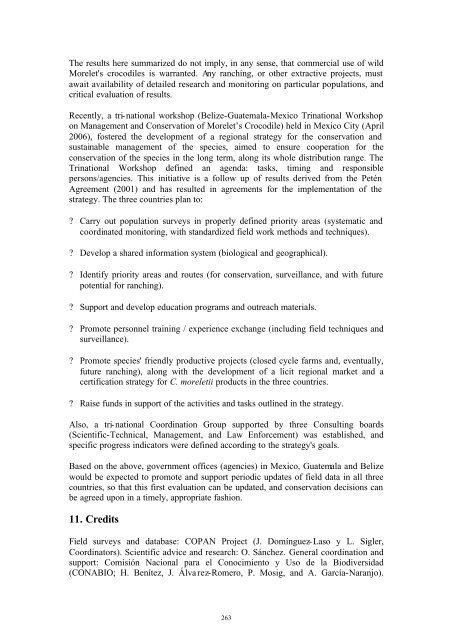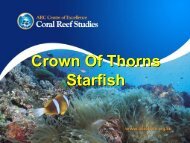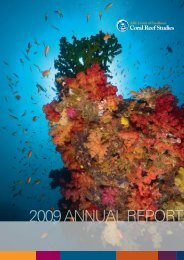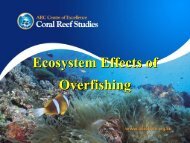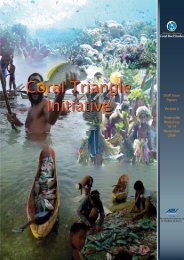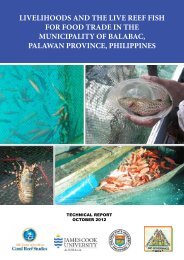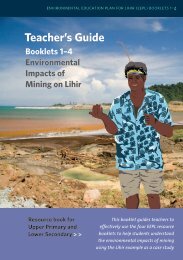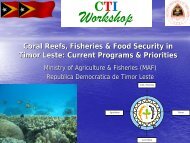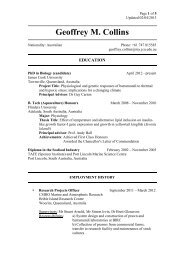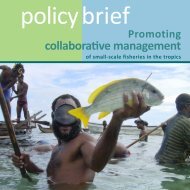Proceedings of the 18th Working Meeting of the Crocodile Specialist ...
Proceedings of the 18th Working Meeting of the Crocodile Specialist ...
Proceedings of the 18th Working Meeting of the Crocodile Specialist ...
You also want an ePaper? Increase the reach of your titles
YUMPU automatically turns print PDFs into web optimized ePapers that Google loves.
The results here summarized do not imply, in any sense, that commercial use <strong>of</strong> wild<br />
Morelet's crocodiles is warranted. Any ranching, or o<strong>the</strong>r extractive projects, must<br />
await availability <strong>of</strong> detailed research and monitoring on particular populations, and<br />
critical evaluation <strong>of</strong> results.<br />
Recently, a tri-national workshop (Belize-Guatemala-Mexico Trinational Workshop<br />
on Management and Conservation <strong>of</strong> Morelet’s <strong>Crocodile</strong>) held in Mexico City (April<br />
2006), fostered <strong>the</strong> development <strong>of</strong> a regional strategy for <strong>the</strong> conservation and<br />
sustainable management <strong>of</strong> <strong>the</strong> species, aimed to ensure cooperation for <strong>the</strong><br />
conservation <strong>of</strong> <strong>the</strong> species in <strong>the</strong> long term, along its whole distribution range. The<br />
Trinational Workshop defined an agenda: tasks, timing and responsible<br />
persons/agencies. This initiative is a follow up <strong>of</strong> results derived from <strong>the</strong> Petén<br />
Agreement (2001) and has resulted in agreements for <strong>the</strong> implementation <strong>of</strong> <strong>the</strong><br />
strategy. The three countries plan to:<br />
Carry out population surveys in properly defined priority areas (systematic and<br />
coordinated monitoring, with standardized field work methods and techniques).<br />
Develop a shared information system (biological and geographical).<br />
Identify priority areas and routes (for conservation, surveillance, and with future<br />
potential for ranching).<br />
Support and develop education programs and outreach materials.<br />
Promote personnel training / experience exchange (including field techniques and<br />
surveillance).<br />
Promote species' friendly productive projects (closed cycle farms and, eventually,<br />
future ranching), along with <strong>the</strong> development <strong>of</strong> a licit regional market and a<br />
certification strategy for C. moreletii products in <strong>the</strong> three countries.<br />
Raise funds in support <strong>of</strong> <strong>the</strong> activities and tasks outlined in <strong>the</strong> strategy.<br />
Also, a tri-national Coordination Group supported by three Consulting boards<br />
(Scientific-Technical, Management, and Law Enforcement) was established, and<br />
specific progress indicators were defined according to <strong>the</strong> strategy's goals.<br />
Based on <strong>the</strong> above, government <strong>of</strong>fices (agencies) in Mexico, Guatemala and Belize<br />
would be expected to promote and support periodic updates <strong>of</strong> field data in all three<br />
countries, so that this first evaluation can be updated, and conservation decisions can<br />
be agreed upon in a timely, appropriate fashion.<br />
11. Credits<br />
Field surveys and database: COPAN Project (J. Domínguez-Laso y L. Sigler,<br />
Coordinators). Scientific advice and research: O. Sánchez. General coordination and<br />
support: Comisión Nacional para el Conocimiento y Uso de la Biodiversidad<br />
(CONABIO; H. Benítez, J. Álvarez-Romero, P. Mosig, and A. García-Naranjo).<br />
263


